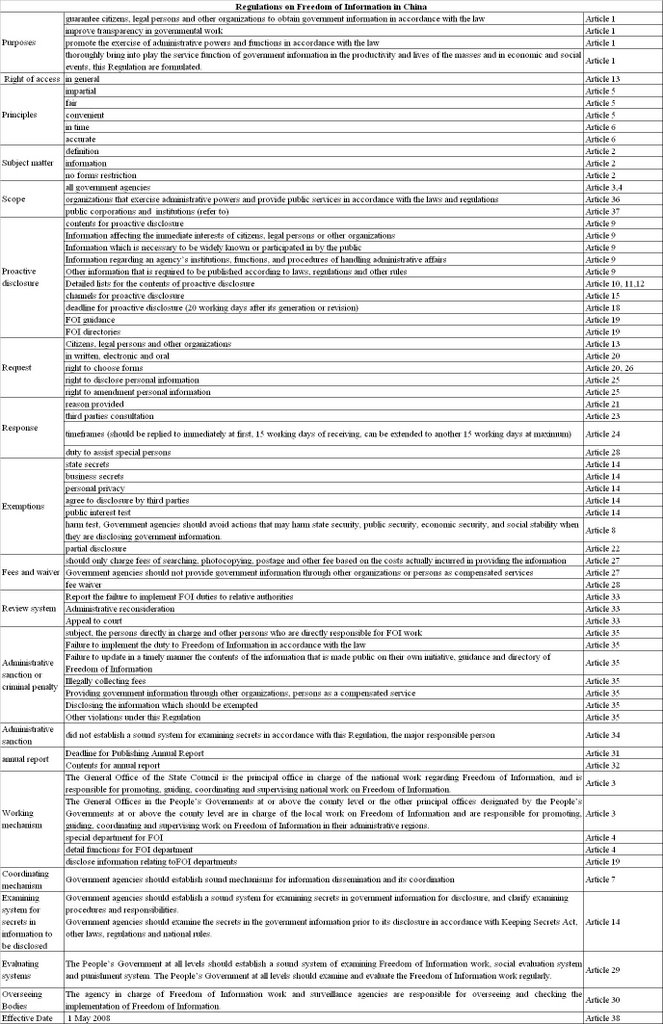China issues landmark decree to encourage gov't transparency
| Take from Xinhua Online BEIJING, April 24 (Xinhua) -- The State Council, China's cabinet, on Tuesday issued what some commentators are calling a milestone regulation to boost official transparency by ordering government departments to be more open in reporting information. The decree, signed by Premier Wen Jiabao, is likely to become the country's most specific and progressive set of rules encouraging the release of government information, when it takes effect on May 1, 2008. Governments at various levels are required to release information which "affects the immediate interests of individuals and groups" or which "should be known by the masses", within 20 working days, the regulation says. Listed as priorities by the State Council are details of how government departments plan to deal with emergencies, government spending, specific fees for public services and results of investigations into environmental protection, public health and food and drugs safety. Local governments are required to publicize data on land acquisitions, residence relocations and related compensation. Village authorities will have to publicize information on land use, financial accounting, the operation of rural collective enterprises and the family situations of village residents in order to ensure the fair enforcement of the family planning policy. But the regulation also contains a clause saying official information released "should not cause social instability and threaten the safety of the state, the public and the economy". Commentators say it is remarkable progress for China, a country where announcing the death toll of natural calamities was considered taboo for decades. The official death toll of the Tangshan earthquake on July 28, 1976, in north China's Hebei Province was not released for three years. More than 240,000 people were killed in that disaster. It was not until the outbreak of Severe Acute Respiratory Syndrome (SARS) in 2003, did the authority realize the importance of the timely release of official information. The new regulation is seen by the government as a move to improve efficiency and prevent abuses of power. "It will also safeguard the public's right to know, the right to participate and the right to supervise," said Zhang Qiong, deputy director of the Legislative Office of the State Council. "The regulation will help curb corruption at its source, largely reducing its occurrence," Zhang said at a press conference on Tuesday. Governments at all levels will be required to compile information directories, that will include the name, address, telephone and fax numbers, and e-mail addresses of departments and people who are responsible for releasing official information. Government departments will be checked regularly to see whether they are withholding information and the public is encouraged to report information blackouts, the decree says. "In case the government fails to carry out its obligations defined by this decree, officials responsible should be punished if the violations are serious," it says. It did not stipulate specific penalties but noted that serious offenders could be prosecuted. The rules also give the citizens the right to seek information that has been not included in official announcements through a written inquiry. Upon receiving the inquiry, the administrative staff should respond immediately or within 30 days at the latest. The regulation also reminds governments to steer clear of releasing "state secrets, confidential commercial information and infringing on an individual's privacy". When in doubt, officials should consult the country's laws to determine whether or not it is inappropriate to make certain information public, the regulation says. If they cannot decide, they should first report to higher authorities," it says. Confidential business information and private information of individuals contained in government databases should not be released without the consent of the person. Administrative staff can only make public confidential information when they believe not releasing it would seriously harm the public interest. Zhang Qiong said information regarding major economic crimes, business fraud and sex offences are examples of cases where the public interest out weights the protection of individual privacy. Individuals who believe their interests have been harmed by the release of confidential information can sue for compensation, the rules say. Government transparency must strike a balance between keeping state secrets, making government affairs public and safeguarding the public's right to know, said Qin Hai, head of the task force charged with promoting government transparency. Wang Yukai, a professor with China National School of Administration, says the regulation will ensure both the public and the government share the same information and effectively prevent under table operations of government affairs." However, some scholars think the new regulation doesn't go far enough. Wang Xisheng, a professor with China's elite Peking University, said that the government's current practice of releasing information fails to meet the demands of the people. He also worries that some government officials might reserve and control information rather than make in public. State secrets are defined by the Law on Guarding State Secrets include classified information concerning major policy decisions on state affairs, national defense and the activities of the armed forces, diplomatic activities, national economic and social development, and science and technology, state security activities and the investigation of criminal offences, and other matters that are classified as state secrets by the state secret protection department. Currently, more than 80 percent of county-level governments have set up websites, according to a leading group under the Central Committee of the Communist Party of China in promoting government transparency. China central government launched its website in 2006. It provides information on government affairs, on-line services and interactive communication between governments and citizens. |
| Editor: Luan Shanglin |

No comments:
Post a Comment